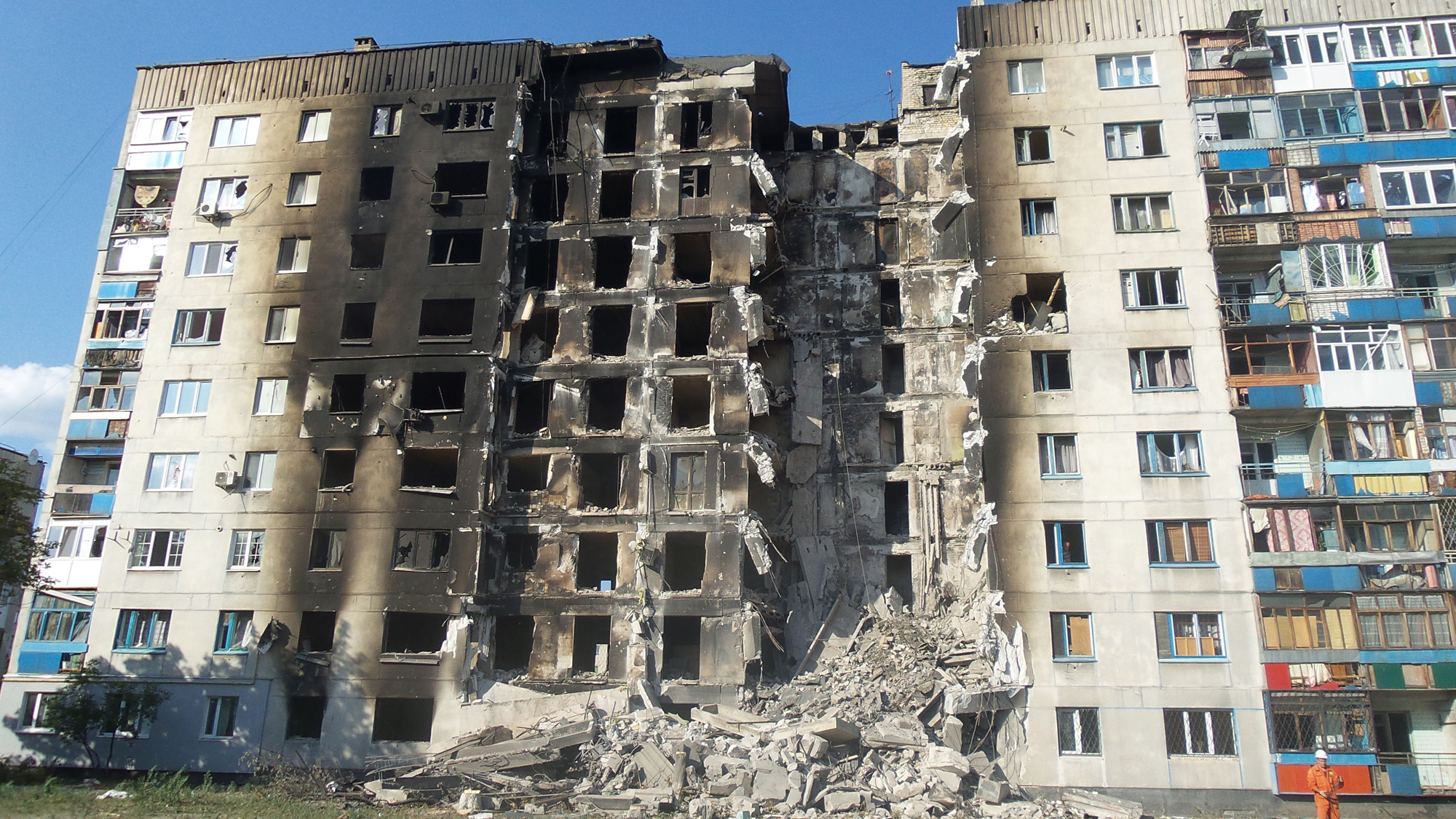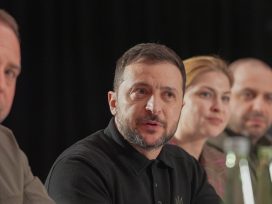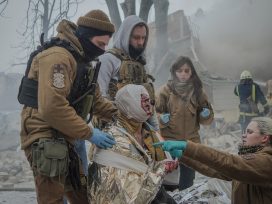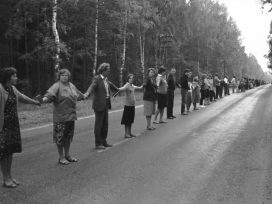A dictionary of military terminology
You can, of course, ignore war. You can act like you don’t notice it, like it doesn’t affect you. You can stubbornly avoid looking in its direction. But then, ostentatiously ignoring it is also taking a stance, and not always a productive one.
When the country you’re a citizen of is enduring military aggression from its nearest neighbor for a third year running, ignoring the military conflict your compatriots are dying in every day is, at the very least, odd. All the more so if you are a writer or an artist. Reality influences art, puts pressure on it, and it would be strange if it were otherwise. Sometimes it’s pleasant to live in a vacuum, but taking up long-term residence there deprives you of a connection with the obvious. Life crawls through your windows, and if in response you prefer simply to close the window, you risk suffocating from the lack of fresh air.
The war in Ukraine has been going on for three years now. Officially it’s called an anti-terrorist operation. In other words, officially the war doesn’t exist. Over these three years, hundreds of thousands of Ukrainian citizens have lived through battles, gunfights, occupation, captivity, and liberation. You can say that to a certain degree this war has managed to affect everyone. Some people have grown accustomed to it, some people have learned how to avoid it, some people have even figured out how to profit from it. Some people see it as their own individual tragedy, as something personal that one has to react to and that one has to answer for. One way or another, the war is what everyone is talking about. They are trying to talk about it. They are learning how to talk about it. And they are also learning how to write about it.

Apartment building destroyed during War in Donbass. Author: Ліонкінг. Source: Wikimedia
A lot is written about the war in Ukraine. Somehow or other, art was forced to react to the societal cataclysms that began in the country with the beginning of the revolution, in winter 2013–2014. In a certain way, for Ukrainian art today, the events on Kyiv’s Maidan, as well as the beginning of the Russian occupation and the operations in the Donbas, have been a serious test of maturity and responsibility. There was always a lot of politics in Ukrainian society’s life, but in the majority of cases art preferred to exist in isolation from direct socio-political pretensions. On the one hand, this attitude is completely justifiable – grappling with the political sphere can easily lead to serving it, to sinking openly into an ideological space, where the artistic element imperceptibly and painlessly gives way to the propagandistic. On the other hand, thorough and steadfast distancing from the processes that determine the social and societal climate often make art too abstract and detached from reality, marginalizing it and sidelining it from public interests. It is difficult to write about politics in a language devoid of political activism. But writing about politics is necessary. And talking about it is necessary. Otherwise propaganda will say it all for you.
There’s another question: how can we write about war? What lexicon should be used? In recent history, Ukraine hasn’t fought wars and – let’s be honest – hasn’t prepared for war. This is in contrast to Russia, with its traditional militaristic discourse and open revanchism that it has been nursing in recent years. So it is unsurprising that, when operations began, the question arose as to how to write about something that you were personally unprepared for, about something whose appearance you couldn’t even foresee, based on your own personal experience and private reflections?
War truly changes the intonation and stylistics of speech. It brackets many phrases that were used completely naturally and reasonably before the war. It changes your attitude towards many words, like, let’s say, irony. Or arrogance. Or cynicism. Or pathos. The last is a really bizarre one – when death occupies an increasingly large part of the space around you, lots of phenomena and pursuits that carried an abundance of emotion, wrath, joy, or rapture with them before the war look totally different today.
War changes distance, changes perspective. You are forced to come face to face with many things that earlier seemed abstract and absent from your personal experience. Death, blood, pain and despair have a totally different sound and colouring when you find yourself a mere arm’s length away from them. Refugees and exiles stop being simply terms you hear in the media when you run into them on the streets of your own city. The word chaplain, which previously you might only have encountered in fiction or history books, sounds totally different after you become personally acquainted with priests on the front. Obviously you can’t write about these priests like they were portrayed in the fiction or history books of your childhood, because this is not at all fictional and not at all historical – this is your own personal experience, which now you have to come to terms with.
War also changes the look of things. You begin to notice details that were uninteresting before. You pay attention to the wrinkles beneath your eyes, to the wedding ring on your finger, to the child in the stroller. The tense coexistence of life and death gives weight to everyday things, those you aren’t used to being thankful for. No, it’s more than that: things that no one taught you to be thankful for. But in the end it is precisely these things that seem the most valuable and precious. Learning to value all of this, learning to talk about all of this – this is difficult both for the reader and for the writer. Difficult, but extraordinarily important.
How does literature react to war? I remember two years ago, in spring 2014, when the first ‘wartime’ texts began to appear. Not necessarily ‘professional’ ones, from professional writers. Sometimes it was simply a few lines someone had posted on social media. ‘Folklore,’ in a certain sense. Sometimes it was overly emotional, but it spoke to the most important thing: no one completely understands how to talk about something they’ve never encountered before. Accordingly, war is often written about with certain literary clichés, with allusions to the classics. Poetry might have been the first thing to react to the war – back in the very first months of the Donbas operations, Ukrainian poets’ reflections began to appear. This shouldn’t strike us strange – the distance between reality and poetry is a fair bit shorter than between, for example, that same reality and prose. By now, however, there are more and more novels and serious investigative reports appearing on this subject. The depth of thought and analysis in these books varies, but that’s not even what is important – what is important is that literature is an extraordinarily effective way to capture and preserve a multitude of names and stories. Stories that don’t appear in the propaganda.
And one more thing. Today no one can say how much longer the war will go on. But one thing can already be predicted: in the future there will be literature written by those who have returned from the war. What this Ukrainian ‘trench’ literature will be like is also difficult to say today. This war is changing all of us – both those who write and those who read. Everything is changing. Literature included. I’d like to hope that it won’t become less humane and open.
Published 24 January 2017
Original in Ukrainian
First published by IWM post No 118 (Fall/Winter 2016)
© Serhij Zhadan / IWM / Eurozine
PDF/PRINTIn collaboration with
In focal points
Newsletter
Subscribe to know what’s worth thinking about.
Related Articles

The ‘Trump–Putin deal’ again places Ukrainians in a subaltern role. The leaked contract with its fantasy $500 billion ‘payback’ has been compared to Versailles, but the US betrayal recalls nothing so much as Molotov–Ribbentrop.

Ukraine faces its greatest diplomatic challenge yet, as the Trump administration succumbs to disinformation and blames them for the Russian aggression. How can they navigate the storm?






